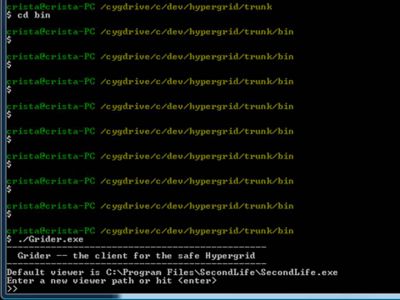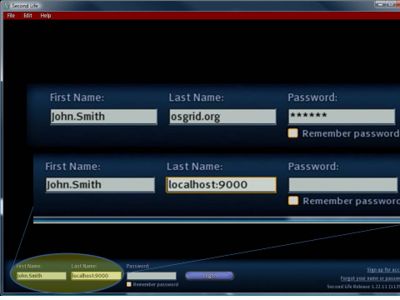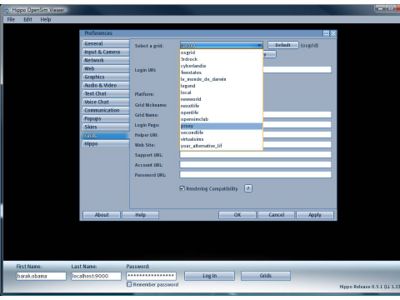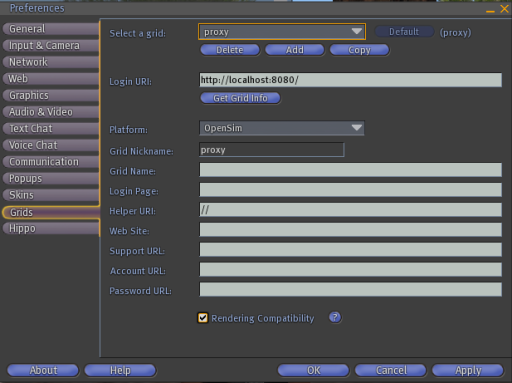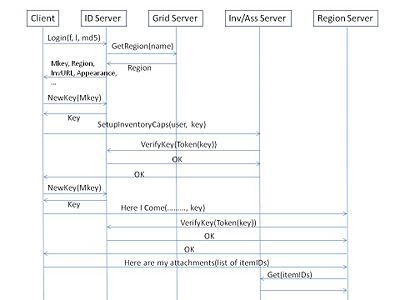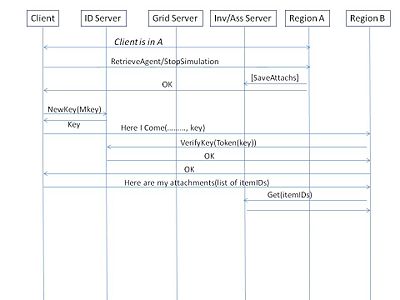Grider
From OpenSimulator
| *** THIS ARTICLE IS ABOUT THIRD PARTY SOFTWARE *** Although OpenSimulator encourages the development of third party software for OpenSimulator, no support can be provided on this. For help with this software, contact the developer of this software directly.Please do not contact the OpenSimulator team with questions about this software. |
Grider is a client for the safe Hypergrid based on LibOMV's GridProxy, and distributed under a BSD license. Its main goal is to explore the protocols that are appropriate for a globally decentralized Virtual Worlds System without having to develop a 3D render from scratch. As such, it wraps the existing Linden Lab-based viewers, both the official viewer and derivatives such as the Hippo, modifying their communications behavior externally -- no source code modification is involved.
Getting Grider Up & Running
Precompiled packages:
http://forge.opensimulator.org/gf/project/hypergrid/frs/
Sources:
http://forge.opensimulator.org/gf/project/hypergrid/scmsvn/?action=AccessInfo
Installing
Unzip the zip file onto some directory.
Running
Run Grider.exe. The first time it runs it asks you for the path to your favorite viewer. This information is then stored in a file called Grider.ini. If you need to change the path to the viewer in the future, simply edit or remove that file.
Connecting to your grid
NOTE: The regions you visit must be running in Hypergrid mode, or you won't be able to Teleport.
If you choose to use the official LL viewer, there are no more set up steps. The picture below shows examples of login information. Enter your information accordingly. Notice that the grid identification goes in the Last Name tab. By default, it uses port 8002 for user servers; if that is not the case for your server, enter the port accordingly (see the example with localhost).
If you choose to use the Hippo, you need to choose as grid "proxy", as shown below:
NOTE: Under Hippo Viewer 0.5.1, Proxy is not there by default.
You will have to manually add the Proxy information as shown in the above image for correct operation.
The Login Screen shown next will allow you to be Authenticated on OSGrid in this example and log you directly into "UC Irvine". You can substitute ANY HG Enabled Grid System.
(Updated June.17.2009 by WhiteStar Magic @ request of Diva)
Current Limitations
This system will allow you to free travel the HyperGrid and connect to Hypergrid systems. - You can have access to your home inventory and make use of it. - Scripted Items Worn (AO's or Other scripted Items such as HUD's), may or may not work, depending on the local Region Server Installation as this is depends on the host you are visiting. - While using Grider, you will not see NON-HyperGrid Enabled Regions/Sims.
(added by WhiteStar Magic, June.17.2009)
Feedback
Please use
http://forge.opensimulator.org/gf/project/hypergrid/tracker/
to send feedback, bug reports, etc.
Current Features
Grider is a fast-evolving client. The goal for the first release, 0.1, was to illustrate how to make a secure client in terms of: (1) Teleports and (2) Inventory Access.
Teleports
Agent transfers are controlled by the client. The regions cannot teleport the user's agent-- they may close the connection to it, but they can't teleport it. This is to avoid malicious teleports and/or connections to unwanted sims (think browser pop ups!). In the future, the current region-side teleports may be supported too, in a more controlled manner, but since the goal of Grider is to explore secure alternatives for the Hypergrid, supporting what already exists doesn't seem that important. The most important thing here is to show how to do client-side teleports, very much like what web user agents do.
Inventory Access
Inventory access is done directly from the client to the inventory server, wherever it is, and independent of what sim the user is. Inventory servers now have the option to deny access to users' inventory from the regions, which addresses the critical vulnerability described in https://lists.berlios.de/pipermail/opensim-dev/2009-February/005409.html.
Access to the user's inventory from the client is done in a secure manner using capabilities, both the few built-in ones like notecard updates, and many new ones related to manipulation of items and folders. Capabilities to the user's inventory are obtained during login, and after an authentication/authorization step that the user's Inventory server performs with respect to the client.
